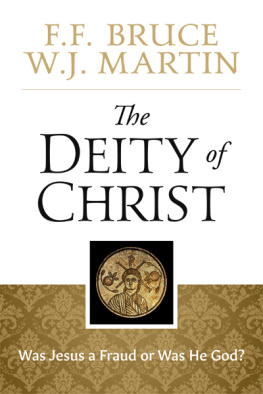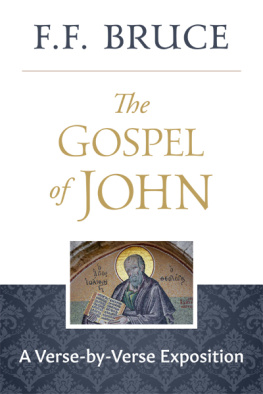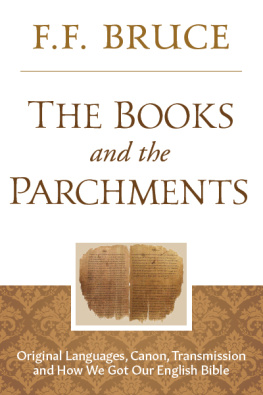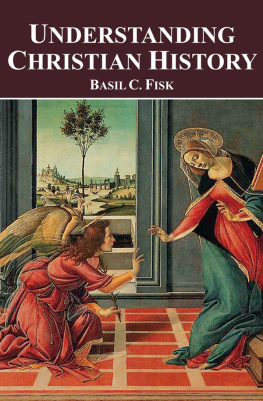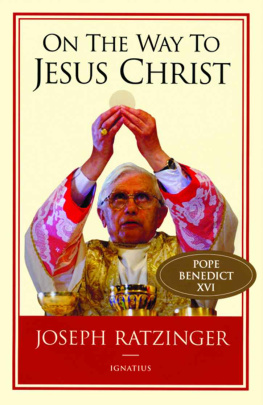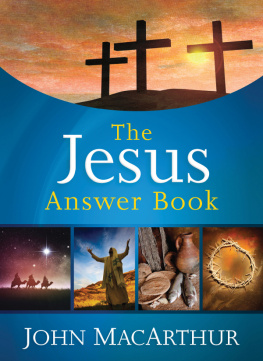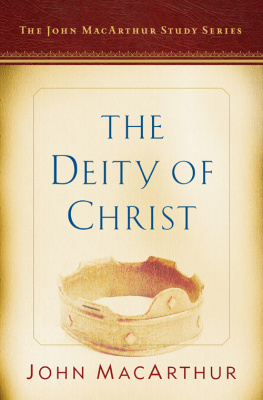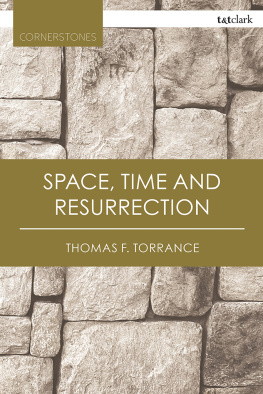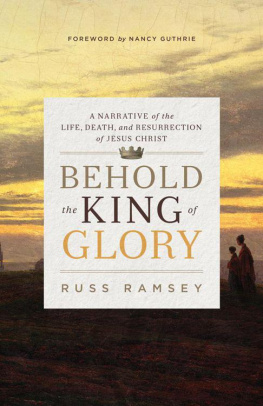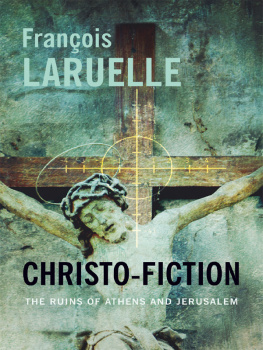CHAPTER 1
OLD TESTAMENT TITLES
OF JEHOVAH
APPROPRIATED BY CHRIST
O ne of the most remarkable things in our Lords ministry is the quiet assurance with which He unhesitatingly applies to Himself titles from the Old Testament that are indisputably used of Jehovah. Moreover, the writers in the New Testament often ascribe such titles to Christ.
THE FIRST AND THE LAST
A significant title assumed by the Lord Jesus in the book of Revelation is the first and the last (1:11; 2:8; 22:13). In 22:16, the Speaker says of Himself, I Jesus have sent mine angel to testify unto you these things, having already said in verse 13, I am Alpha and Omega,... the first and the last. Also, in Revelation 2:8 there is no doubt about the Person to whom the words refer: These things saith the first and the last, who died and came to life. This designation, the first and the last, occurs three times in Isaiah (41:4; 44:6; 48:12) where, on each occasion, Jehovah is the speaker. In the passage in chapter 44, we read,
Thus says Jehovah, the King of Israel,
and his Redeemer, the Lord of hosts:
I am the first and I am the last;
besides me there is no god.
AUTHOR OF ETERNAL WORDS
The Old Testament constantly claims to be an authoritative and immutable communication from God. In Isaiah 40:8, we are told, The grass withers, the flower fades; but the word of our God will stand for ever. Our Lord unquestionably subscribes to this view of the Old Testament as a divine revelation. For instance, He says, For verily I say unto you, Till heaven and earth pass, one jot or one tittle shall in no wise pass from the Law, till all be fulfilled (Matthew 5:18). For His own words, He makes a substantially similar claim: Heaven and earth shall pass away, but my words shall not pass away (Matthew 24:35).
LIGHT
A well-known title of the Lord in the Old Testament is light. We find in the opening verse of Psalm 27, Jehovah is my light and my salvation; whom shall I fear? And again in Isaiah 60:20,
Your sun shall no more go down,
nor your moon withdraw itself;
for Jehovah will be your everlasting light,
and the days of your mourning will be ended.
Our Lord claims in John 8:12, I am the light of the world. And a little later He repeats it in John 9:5, As long as I am in the world, I am the light of the world. And John says of Him, That was the true Light, which lighteth every man that cometh into the world (John 1:9). And four times in this chapter, he refers to Jesus as the light (John 1:4, 5, 7, 8).
Again, following on the Messianic prophecy of Isaiah (59:20), we have, in 60:1, light designating the Messiah, equated with the glory of Jehovah. Arise, shine [i.e., Zion]; for your light has come, and the glory of the Lord has risen upon you. It is instructive to see that John, in the introduction to his first epistle, uses the very same epithet of God that he had already used of the incarnate Son in the opening verses of his gospel, designating Him the light that the darkness has not overcome, (John 1:5) while in 1 John 1:5, God is light, and in him is no darkness at all.
ROCK
Two words are commonly used in Hebrew for rock , as well as for the word stone . One is used in Psalm 18:2, Jehovah is my rock. The other is used in Psalm 95:1, O come, let us sing unto Jehovah: let us make a joyful noise to the rock of our salvation! Paul, in 1 Corinthians 10:4, interprets the rock of Exodus 17:6 as referring to Christ. Stone is used as a title of God in Genesis 49:24: By the hands of the mighty God of Jacob; (from thence is the shepherd, the stone of Israel). It is also in the Messianic passage in Isaiah 28:16,
Behold, I am laying in Zion for a foundation
a stone, a tested stone.
In his first letter, Peter understands this passage to be speaking of Christ as the foundation stone of the spiritual house, the church (1 Peter 2:5-8). Although the word here is not the one used in Matthew 16:18 (and upon this rock I will build my church), the similarity of function is so obvious that Peter must also have had these words in mind. This seems all the more certain from verse 8, where he applies to Christ the word rock , a description of Jehovah, quoting from Isaiah 8:14: A stone that will make men stumble, a rock that will make them fall. (Notice that in this Isaiah passage both words, stone and rock , are used.) On linguistic grounds, there could be no objection to seeing in Matthew 16:18 another instance of our Lords taking to Himself a common title of Jehovah in the Old Testament (in 2 Samuel 22 and Psalm 18, rock is used five times of God).
BRIDEGROOM
The figure of a bridegroom is frequently used in the Old Testament either implicitly or explicitly of Jehovah. In Hosea 2:16, for instance, Jehovah says, You will call me my husband. And He says in Isaiah 62:5,
As the bridegroom rejoices over the bride,
so shall your God rejoice over you.
Our Lord often depicts Himself as a bridegroom. In a reply to the Pharisees, He says concerning Himself, Can the children of the bridechamber fast, while the bridegroom is with them? (Mark 2:19). Again, in the parable of the foolish virgins, He is the bridegroom (Matthew 25:1-13). In that great, final, beatific vision (Revelation 21:2), the church is depicted as a bride adorned for her husband.
SHEPHERD
In Psalm 23:1 we read, Jehovah is my shepherd, and in Ezekiel 34:15, I myself will be the shepherd of my sheep. In John 10:11 (I am the good shepherd. The good shepherd lays down his life for the sheep), our Lord uses this title of Himself. Peter calls Him the Shepherd and Guardian of your souls (1 Peter 2:25) and the chief Shepherd (1 Peter 5:4). The writer of the epistle to the Hebrews speaks of Him as the great shepherd (13:20). That the title is unique is clear from John 10:16: So there shall be one flock, one shepherd. To round out the analogy, the Lord refers to His people as my sheep, as does God in the Old Testament: Thus says the Lord God: Behold, I, I myself will search for my sheep... I will feed them on the mountains of Israel (Ezekiel 34:11, 13). Jesus uses very similar words is His post-resurrection talk with Peter (John 21:17). His very last injunction to Peter is, Feed my sheep.
FORGIVER OF SINS
In the Old Testament, God alone has the right and power to forgive sins: For I [Jehovah] will forgive their wickedness, and will remember their sins no more (Jeremiah 31:34); But there is forgiveness with thee, that thou mayest be feared (Psalm 130:4). In the New Testament, we find our Lord claiming this right for Himself. In Luke 5:21, we read of the Pharisees protesting that only God could forgive sins. This was to them, as it should be to us, self-evident. To this, Christ replied by substantiating His authority to forgive, by healing the paralytic. In Acts 5:31, Peter proclaims Christ as the one whom God has exalted at his right hand as Leader and Savior, to give repentance to Israel and forgiveness of sins. In Colossians 2:13, Paul speaks of God having forgiven us all our transgressions, while in 3:13 he writes, the Lord [or Christ] has forgiven you. If the right reading here is Lord , it must stand for Christ , as is clear from such a reference as Christ Jesus the Lord in Colossians 2:6.
REDEEMER
The act of redemption is peculiar to God in the Old Testament. Two Hebrew words are in use, and both occur in Hosea 13:14: From the power of Sheol, I will ransom them; from death I will redeem them. Again in Psalm 130:7-8,
For with Jehovah there is steadfast love,
and with him is plenteous redemption.
And he will redeem Israel
from all his iniquities.
A direct parallel to this is found in Titus 2:13-14, with the difference being that now Christ is identified with God (see 2:10): Our great God and Savior Jesus Christ, who gave himself for us to redeem us from all iniquity. A different Greek verb for redemption is found in Galatians 3:13: Christ redeemed us from the curse of the law. Again, in Revelation 5:9, For thou [the Lamb] wast slain, and hast redeemed us to God by thy blood out of every kindred, and tongue, and people, and nation.
Next page
